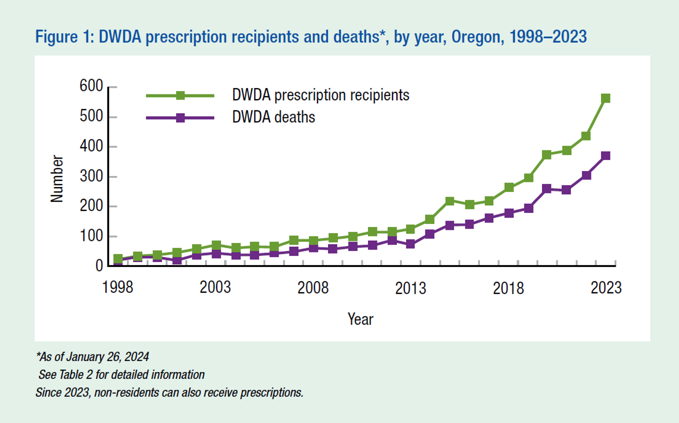Press Statement – A Further Warning From Oregon: More Assisted Suicides, More Bad Deaths
Read in PDFIn 1997, Oregon became the first jurisdiction to legalise physician-assisted suicide for people with a terminally illness. Since then numbers have increased year-on-year and this shows no sign of slowing.
This week, Oregon produced its twenty-sixth report. This shows that 2023 saw a 20% increase in assisted suicide compared to 2022, which itself had been a record-breaking year.

Last year, at least 367 people died by assisted suicide, an average of one a day. This would be equivalent to 15 assisted suicides per day in population the size of the United Kingdom.
Not all these deaths were quick or easy. In 159 cases, death was motivated by a fear of being a burden on family, friends or care givers. In 28 cases, death occurred without the presence or even the knowledge of a loved one. Complications such as seizures or vomiting occurred in around ten percent of cases and this does not include lingering deaths. As Oregon continues to experiment with different cocktails of lethal drugs, median times to death have increased (from 22 minutes in 1998 to 52 minutes in 2023). One patient in 2023 took more than five days to die. If this had been an execution, it would have been cruel or unusual punishment.
The law is supposed to be restricted to people who would otherwise die of natural causes within six months, but in 2023 it was provided to 17 people who had outlived their six-month prognosis. One patient had lived four and a half years since being approved for assisted suicide. These were people who had decided to delay taking the lethal drugs. For the majority, who took the drugs within four weeks of requesting them, we have no way of knowing how many more months or years they otherwise could have lived.
While Oregon continues to break records for numbers of assisted suicides, numbers who did not inform their families, and numbers and length of lingering deaths by assisted suicide, its rate of non-assisted suicide also continues to climb. Statistics from the Centers of Disease Control and Prevention show that between 2005 and 2021 the (‘non-assisted’) suicide rate in Oregon increased from 14.9 per 100,000 to 19.5 per 100,000. For comparison, the suicide rate in England and Wales in 2021 was 10.7 per 100,000.
Research published in 2022 demonstrated that, in the United States, legalising physician-assisted suicide had been associated with a 6% increase in the suicide rate, with a 14% increase among women. These results were statistically significant even after controlling for socio-demographic factors. Legalisation of euthanasia or assisted suicide is a threat to suicide prevention.
In England and Wales, it is illegal to encourage or assist suicide. The current law helps prevent suicide and helps protect vulnerable people. The example of Oregon this year, as in the past 25 years, continues to provide a warning of what can happen if this protection is removed.
END
Notes to Editors:
- Any part of the above can be quoted as coming from our Director, Professor David Albert Jones.
- If the issues discussed here affect you or someone close to you, you can call Samaritans on 116 123 (UK and ROI), visit their website or contact them on: jo@samaritans.org
- If you are reporting or writing about a case of death by suicide, whether assisted or non-assisted, please consult the Samaritans’ media guidelines on how to do so responsibly.
- For more background information on this issue, see the Anscombe Centre briefing paper on assisted suicide and suicide prevention.
- For more information on the Anscombe Bioethics Centre, see our website: www.bioethics.org.uk
- For interviews or comment, contact: media@bioethics.org.uk
Most recent
Press Release – Anscombe Bioethics Centre Launches ‘Advance Decisions and Ethical Choices’ Project
31 July 2025
The Anscombe Bioethics Centre is pleased to launch a new suite of resources on advance statements, l...
Statement on the Anscombe Bioethics Centre
31 July 2025
A statement from the Governing Body of the Anscombe Bioethics Centre and the Trustees of the Catholi...
Copyright Announcement
25 July 2025
Henceforth, all work which had Anscombe Centre or Linacre Centre copyright is now dedicated to the p...
Sincerest Thanks for Your Support
Staff are grateful to all those who sustained the Centre in the past by their prayers and the generous financial support from trusts, organisations, communities and especially from individual donors, including the core funding that came through the Day for Life fund and so from the generosity of many thousands of parishioners. We would finally like to acknowledge the support the Centre has received from the Catholic community in Ireland, especially during the pandemic when second collections were not possible.
We would like to emphasise that, though the Centre is now closed, these donations have not been wasted but have helped educate and support generations of conscientious healthcare professionals, clerics, and lay people over almost 50 years. This support has also helped prevent repeated attempts to legalise euthanasia or assisted suicide in Britain and Ireland from 1993 till the end of the Centre’s work on 31 July 2025.



